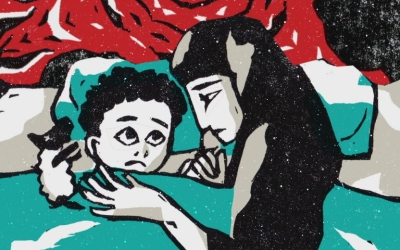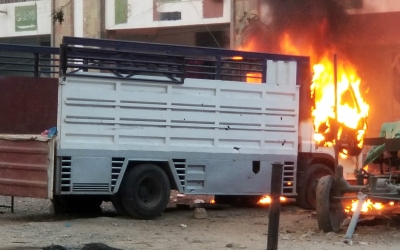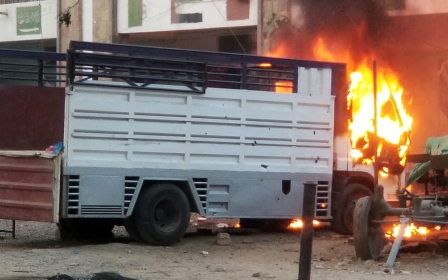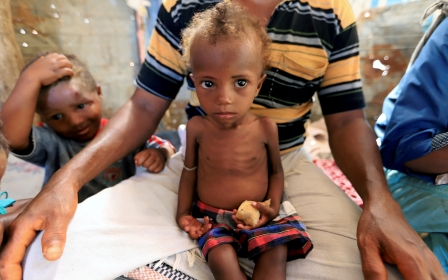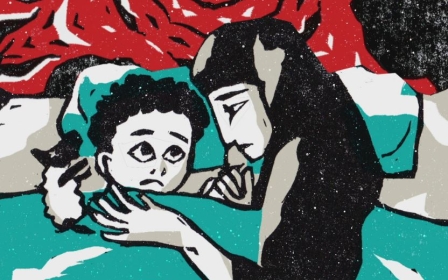Yemeni president attends first parliamentary session in the country since Houthi coup
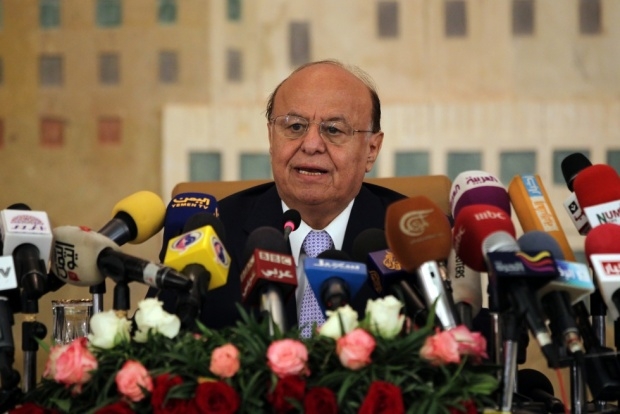
Members of Yemen's parliament loyal to President Abd Rabbuh Mansour Hadi met on Saturday for the first time since a civil war broke out in 2015.
Hadi, who lives in Saudi Arabia while rival Houthi forces control the capital Sanaa, made a rare visit to his country to attend the meeting.
The session, held in Sayun, in the southeastern province of Hadhramaut, was described in a speech by the president as "historic," Reuters news agency reported.
Repeating calls for the Houthis to work for peace with his Saudi-backed government, Hadi said: "It is high time to stop your crimes, look at our torn country and displaced people.
"Our country is yours. We extended our hand for peace and we do that again today."
The event, held under heavy security with Saudi troops on patrol, was attended by Hadi and ambassadors from the 19 countries backing a power transition in Yemen.
Meanwhile in Sanaa, Houthis have started to organise elections to fill 24 vacant seats in the same parliament, state news agency SABA said.
Both sides are under pressure from international players to implement a United Nations-sponsored ceasefire deal agreed last year in Sweden and to prepare for a wider political dialogue that would end the four-year-old war.
Under that deal, lawmakers from both sides would ultimately meet to agree on a political framework.
'Choices of war and peace'
Hadi's Riyadh-backed government, which is still recognised internationally, has been based in the southern port city of Aden since 2015 and Hadi has not set foot there since a visit last August.
The Hadi-aligned parliamentarians gathered in Sayun elected Sultan al-Burkani, of late Yemeni president Ali Abdullah Saleh's General People's Congress (GPC), as their new speaker.
The Saudi-led military coalition fighting the Houthis in the devastating war has been trying to recruit GPC members and fighters since Saleh was killed in December 2017, after switching sides away from the Houthis.
"This extraordinary session is held in a historic moment as we stand in a crossroad between choices of war and peace," Hadi told the 145-strong parliament.
"We support the UN special envoy to achieve a comprehensive peace," he said.
In Sanaa, Houthi Prime Minister Abdelaziz Bin Habtour put forward plans for an election under Houthi auspices for the same parliament.
"Voters will elect who will represent them constitutionally and legally," he said, quoted by SABA.
Military stalemate
Last December in Stockholm, the two sides agreed on a ceasefire and troop withdrawal in Hodeidah port, an exchange of prisoners, and the reopening of humanitarian corridors to help millions of starving Yemenis, with international monitors to oversee events.
The pact is intended to clear the way for wider political negotiations, with a transitional government supported by both sides, to end the war.
The Saudi-led coalition has accused the Houthis of breaching the agreement.
The Houthis want more guarantees from the UN that the other side will not exploit their withdrawal.
The ceasefire in Hodeidah has largely held despite an increase in violence in other parts of the country not subject to the agreement.
The Saudi-led coalition intervened in Yemen's civil war in 2015 to restore Hadi's government, but the war has reached a military stalemate.
Tens of thousands of people, mostly civilians, have been killed and an economic collapse has left about 16 million facing severe hunger.
Middle East Eye delivers independent and unrivalled coverage and analysis of the Middle East, North Africa and beyond. To learn more about republishing this content and the associated fees, please fill out this form. More about MEE can be found here.


